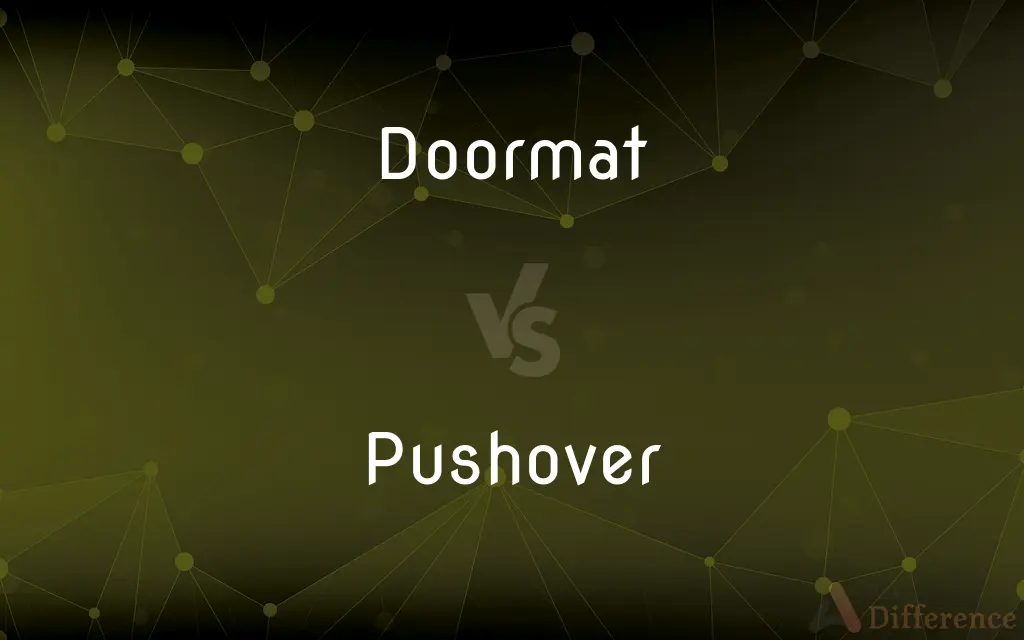Doormat vs. Pushover — What's the Difference?
By Tayyaba Rehman & Maham Liaqat — Updated on March 12, 2024
A doormat is often passive, enduring disrespect without objection, whereas a pushover easily yields to others' wishes or pressures.

Difference Between Doormat and Pushover
Table of Contents
ADVERTISEMENT
Key Differences
A doormat is metaphorically someone who allows others to disrespect them without standing up for themselves, demonstrating a high level of passivity and tolerance for mistreatment. On the other hand, a pushover is an individual who is easily influenced or persuaded to give in, often lacking the assertiveness to maintain their stance.
Doormats often endure negative treatment in silence, perhaps out of fear of confrontation or low self-esteem, showing a deep-rooted issue with self-respect. Whereas pushovers might simply prefer to avoid conflict or may value harmony over their personal preferences, indicating a different set of motivations.
While a doormat's behavior might stem from a belief in self-sacrifice or a misconception of what it means to be accommodating, a pushover's actions are more about the desire to please others and the inability to say no, even when it's detrimental to their own interests.
In relationships, a doormat may remain loyal despite being mistreated, reflecting a possible fear of abandonment or low self-worth. Conversely, a pushover might acquiesce to demands or make concessions readily, not necessarily because they're being mistreated, but to maintain peace or out of an exaggerated need to be liked.
In professional settings, being a doormat can lead to being overloaded with work or overlooked for promotions, as one's boundaries are not respected. Pushovers, while they may also be overloaded, tend to suffer more from a lack of respect due to their perceived inability to stand firm on decisions or demands.
ADVERTISEMENT
Comparison Chart
Definition
Someone who allows themselves to be mistreated
Someone easily persuaded or influenced
Motivation
Fear of confrontation, low self-esteem
Desire to please, avoid conflict
Behavior
Endures disrespect silently
Yields quickly to others' wishes
Outcome
Often overlooked, disrespected
Seen as weak or unable to stand up for oneself
Context
Personal relationships, work
Any situation requiring assertiveness
Compare with Definitions
Doormat
Someone tolerating disrespect silently.
As a doormat, she never complained about being overworked.
Pushover
Easily persuaded or influenced.
As a pushover, Mark quickly agreed to the changes without objection.
Doormat
Often overlooked in personal and professional settings.
Being a doormat, her contributions were rarely acknowledged.
Pushover
Tends to yield to avoid displeasing others.
She's such a pushover, always letting her friends choose the movie.
Doormat
A person who doesn't stand up for themselves.
Despite the constant insults, Jake remained a doormat, never defending his ideas.
Pushover
Lacks assertiveness.
Her reputation as a pushover made her the go-to for extra assignments.
Doormat
Characterized by excessive passivity.
His doormat attitude meant he was always the last to leave the office.
Pushover
Prioritizes harmony over personal preferences.
To avoid conflict, he became a pushover in every decision.
Doormat
Demonstrates a high tolerance for mistreatment.
Even when belittled, he played the doormat, smiling through the disrespect.
Pushover
Seen as weak in decision-making.
His pushover nature affected his leadership credibility.
Doormat
A mat placed before a doorway for wiping the shoes.
Pushover
One that is easily defeated or taken advantage of.
Doormat
(Slang) One who submits meekly to domination or mistreatment by others.
Pushover
Something that is easily done or attained.
Doormat
A coarse mat at the entrance to a house, upon which one wipes one's shoes.
Wipe your shoes on the doormat before you start plodding around in the house.
Pushover
Someone who is easily swayed or influenced to change his/her mind or comply.
I'm a pushover when it comes to buying new kitchen gadgets.
Doormat
Someone who is overly submissive to others' wishes.
He's such a doormat, he lets everyone walk all over him.
Pushover
Someone who lets him/herself be picked or bullied on without defending or standing up for him/herself.
Doormat
A mat placed outside and exterior door for wiping the shoes before entering.
Pushover
Something that is easy to do or accomplish; an easy task.
Doormat
A person who is habitually abused, taken advantage of or humiliated; sometimes, one who is physically weak; as, they used him for a doormat.
Pushover
Someone who is easily taken advantage of
Doormat
A person who is physically weak and ineffectual
Pushover
Any undertaking that is easy to do;
Marketing this product will be no picnic
Doormat
A mat placed outside an exterior door for wiping the shoes before entering
Common Curiosities
What makes someone a doormat?
Tolerance for disrespect and passivity in standing up for oneself.
Is being a pushover always a negative trait?
While it's seen negatively in terms of lack of assertiveness, it can stem from a desire for harmony.
Why might someone be a pushover?
Desire to please others and avoid conflict.
How do doormats behave in relationships?
They remain loyal despite mistreatment, possibly due to fear of abandonment.
Can a doormat change their behavior?
Yes, with increased self-esteem and assertiveness training.
What's the difference between a doormat and a pushover in a work setting?
A doormat is overlooked and disrespected, while a pushover is seen as weak in decision-making.
How can one stop being a doormat?
By setting boundaries, practicing assertiveness, and improving self-worth.
What psychological factors contribute to someone being a doormat?
Low self-esteem, fear of confrontation, and possibly past trauma.
Can being a pushover lead to positive outcomes?
It might in the short term by avoiding conflict, but it generally leads to a lack of respect.
Are pushovers aware of their tendencies?
Not always; they might not realize the extent of their acquiescence.
Can pushovers have healthy relationships?
It's challenging unless they learn to assert their needs and desires.
Is it easier for a pushover to change their ways compared to a doormat?
It depends on the individual's willingness to develop assertiveness and set boundaries.
Does society view doormats and pushovers differently?
Yes, doormats are viewed more negatively due to their passive acceptance of mistreatment.
How does being a doormat or pushover affect one's mental health?
It can lead to stress, resentment, and low self-esteem.
Are there benefits to being a pushover?
It may lead to temporary peace and harmony, but at the cost of one's self-respect.
Share Your Discovery

Previous Comparison
Subsequent vs. Subsequential
Next Comparison
Gnarled vs. KnurledAuthor Spotlight
Written by
Tayyaba RehmanTayyaba Rehman is a distinguished writer, currently serving as a primary contributor to askdifference.com. As a researcher in semantics and etymology, Tayyaba's passion for the complexity of languages and their distinctions has found a perfect home on the platform. Tayyaba delves into the intricacies of language, distinguishing between commonly confused words and phrases, thereby providing clarity for readers worldwide.
Co-written by
Maham Liaqat














































